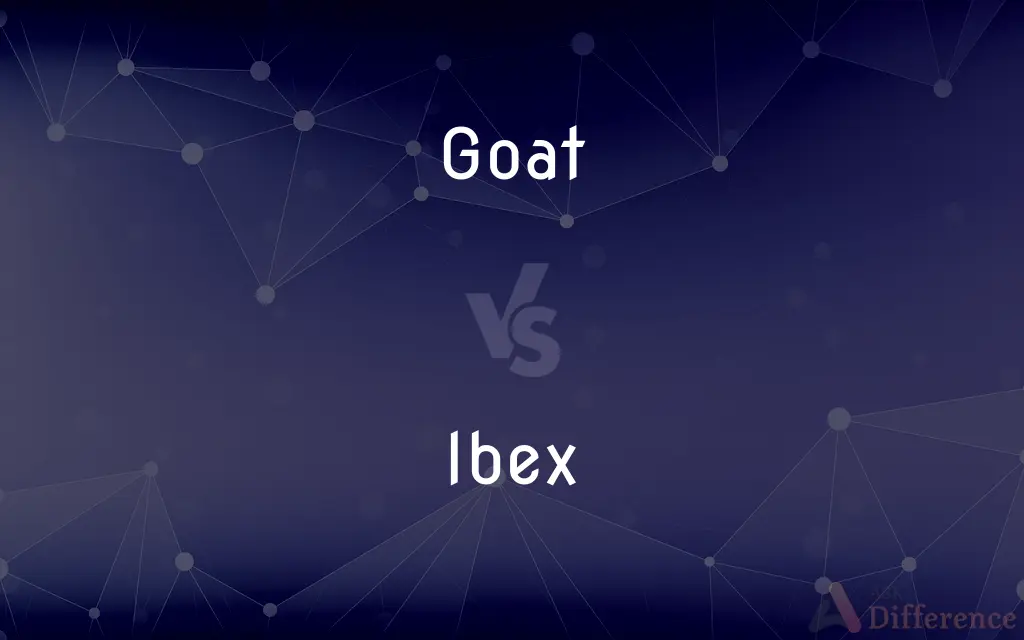Goat vs. Ibex — What's the Difference?
Edited by Tayyaba Rehman — By Urooj Arif — Updated on March 31, 2024
Goats are versatile domestic animals bred for various purposes, while ibexes are wild goats known for their impressive horns and mountain habitats.

Difference Between Goat and Ibex
Table of Contents
ADVERTISEMENT
Key Differences
Goats are domesticated animals that have been part of human agriculture for thousands of years, providing milk, meat, and fiber. They are adaptable to various environments, from farms to backyards. On the other hand, ibexes are wild goats primarily found in rugged mountain ranges, such as the Alps, where they are adapted to steep, rocky terrain. Their survival skills and agility in these environments are remarkable.
While goats have been selectively bred for traits that benefit humans, including docility and productivity, ibexes have evolved natural traits that ensure their survival in the wild, such as long, curved horns used for defense and dominance battles within their species. This evolutionary divergence highlights the impact of human intervention versus natural selection.
Goats come in a variety of breeds, each with its own characteristics tailored to specific needs, such as dairy production or weed control. Ibexes, however, belong to a few species with relatively uniform physical characteristics, emphasizing their adaptation to specific ecological niches rather than human needs.
In terms of social behavior, goats can be quite sociable and are often kept in herds for companionship and collective security. They show a broad range of interactions with humans and other animals. Conversely, ibexes form herds based on gender and age, with complex social structures that govern interactions, particularly during the mating season.
While both goats and ibexes can thrive in tough conditions, the habitats they prefer reflect their adaptations and roles. Domestic goats are found worldwide, thriving in diverse climates and settings, whereas ibexes are confined to specific mountainous regions, their existence tied closely to these wild landscapes.
ADVERTISEMENT
Comparison Chart
Habitat
Domesticated, worldwide
Wild, mountain ranges
Purpose
Meat, milk, fiber, pets
Not domesticated, no direct purpose for humans
Physical Traits
Varied, breed-specific
Large horns, adapted for rugged terrain
Social Structure
Sociable, adaptable to human presence
Gender and age-based herds, less human interaction
Adaptation
Bred for human needs
Evolved for survival in specific environments
Compare with Definitions
Goat
Bred for a variety of purposes, including dairy production, meat, and land clearing.
They use goats to naturally clear out brush in their vineyard.
Ibex
Forms herds based on age and gender, with complex social behaviors.
A herd of male ibex was observed head-butting during mating season.
Goat
Highly adaptable to various environments and climates.
Their goats thrived even in the harsh northern climate.
Ibex
Less accustomed to humans, living in remote, wild areas.
Ibexes keep their distance from hikers and mountain climbers.
Goat
A domesticated animal often kept for milk, meat, or as pets.
The family's goat provides fresh milk daily.
Ibex
Adapted to live in rugged mountain terrains.
The ibex thrives in environments too steep for most predators.
Goat
Goats come in many breeds, each with unique characteristics.
The Nigerian Dwarf goat is popular for urban farming.
Ibex
Possess natural survival traits, such as agility and strong horns for defense.
The ibex uses its horns effectively in battles for dominance.
Goat
Goats are known for their sociable and curious nature.
Their goats always come to greet visitors at the farm.
Ibex
A wild goat species known for its impressive, curved horns and mountainous habitat.
An ibex was spotted scaling the steep cliffs effortlessly.
Goat
The domestic goat or simply goat (Capra aegagrus hircus) is a subspecies of C. aegagrus domesticated from the wild goat of Southwest Asia and Eastern Europe. The goat is a member of the animal family Bovidae and the subfamily Caprinae, meaning it is closely related to the sheep.
Ibex
An ibex (plural ibex, ibexes or ibices) is any of several species of wild mountain goat (genus Capra), distinguished by the male's large recurved horns, which are transversely ridged in front. Ibex are found in Eurasia, North Africa, and East Africa.
Goat
A hardy domesticated ruminant mammal that has backward-curving horns and (in the male) a beard. It is kept for its milk and meat, and noted for its lively behaviour.
Ibex
Any of several wild goats of the genus Capra, especially C. ibex, native to mountainous regions of Eurasia and northern Africa, and having long, ridged, backward-curving horns.
Goat
A lecherous man.
Ibex
A type of wild mountain goat of the genus Capra, such as the species Capra ibex.
Goat
A stupid person; a fool
Just for once, stop acting the goat
Ibex
(heraldry) An imaginary creature with serrated horns, somewhat similar to the heraldic antelope.
Goat
A scapegoat.
Ibex
One of several species of wild goats having very large, recurved horns, transversely ridged in front; - called also steinbok.
Goat
A domesticated ruminant mammal (Capra hircus) having backward curving horns and a beard especially in the male, raised for its wool, milk, and meat.
Ibex
Wild goat of mountain areas of Eurasia and northern Africa having large recurved horns
Goat
Any of various wild ruminant mammals of the genus Capra and related genera, including the ibexes and the wild goat (C. aegagrus) of Eurasia.
Goat
A lecherous man.
Goat
A person who is blamed for a failure or misfortune, especially a scapegoat.
Goat
See Capricorn.
Goat
See Capricornus.
Goat
A mammal, Capra aegagrus hircus, and similar species of the genus Capra.
Goat
(uncountable) The meat of the aforementioned animal.
Ugh, we're having goat for dinner again.
Goat
(slang) A lecherous man.
Goat
(informal) A scapegoat.
Goat
(slang) A Pontiac GTO car.
Goat
(speech recognition) A person who is not easily understood by a speech recognition system; contrasted with sheep.
Goat
A fool, loser, or object of ridicule.
Goat
(roller derby) A blocker who is isolated behind the opposing team's blockers, so as to slow down the pack.
Goat
(acronym) Greatest of All Time
Goat
(transitive) To allow goats to feed on.
Goat
(transitive) To scapegoat.
Goat
To isolate (an opposing blocker) behind one's own blockers, so as to slow down the pack.
Goat
A hollow-horned ruminant of the genus Capra, of several species and varieties, esp. the domestic goat (Capra hircus), which is raised for its milk, flesh, and skin.
Goat
Any of numerous agile ruminants related to sheep but having a beard and straight horns
Goat
A victim of ridicule or pranks
Goat
(astrology) a person who is born while the sun is in Capricorn
Goat
The tenth sign of the zodiac; the sun is in this sign from about December 22 to January 19
Common Curiosities
Are ibexes endangered?
Some ibex species are considered endangered due to habitat loss and hunting, but conservation efforts are in place.
Can goats and ibexes interbreed?
While theoretically possible, their different lifestyles and habitats make natural interbreeding unlikely.
What do goats eat?
Goats are versatile eaters, consuming a wide variety of plants, including weeds, shrubs, and hay.
What is the main difference between a goat and an ibex?
The main difference is their domestication status; goats are domesticated animals with various breeds, while ibexes are wild, adapted to mountainous terrains.
Do goats make good pets?
Yes, goats can make friendly and entertaining pets, especially in rural or suitable suburban settings.
Why are ibexes horns so large?
The large horns of ibexes are used for defense against predators and to establish dominance within their social groups.
What type of climate do ibexes prefer?
Ibexes prefer the cooler, alpine climates of mountainous regions.
What do ibexes eat?
Ibexes are herbivores that primarily feed on grasses, leaves, and twigs found in their mountainous habitats.
How long can ibexes live?
Ibexes can live up to 20 years in the wild, though many face threats from predators and environmental challenges.
How long can goats live?
Domestic goats typically live between 10 to 18 years, depending on the breed and care.
How do goats communicate?
Goats communicate through vocalizations, body language, and sometimes through scent.
Can goats live in the wild?
While goats are domesticated, some can adapt and survive in the wild if they escape or are released.
How do ibexes communicate?
Ibexes communicate using visual signals, vocalizations, and scent marking to convey different messages.
What type of climate do goats prefer?
Goats are adaptable and can thrive in a variety of climates, from cold to tropical.
Are goats or ibexes smarter?
Both species show intelligence and adaptability, but domestic goats have been more studied for their ability to solve problems and interact with humans.
Share Your Discovery

Previous Comparison
Cynical vs. Pessimistic
Next Comparison
Happenchance vs. HappenstanceAuthor Spotlight
Written by
Urooj ArifUrooj is a skilled content writer at Ask Difference, known for her exceptional ability to simplify complex topics into engaging and informative content. With a passion for research and a flair for clear, concise writing, she consistently delivers articles that resonate with our diverse audience.
Edited by
Tayyaba RehmanTayyaba Rehman is a distinguished writer, currently serving as a primary contributor to askdifference.com. As a researcher in semantics and etymology, Tayyaba's passion for the complexity of languages and their distinctions has found a perfect home on the platform. Tayyaba delves into the intricacies of language, distinguishing between commonly confused words and phrases, thereby providing clarity for readers worldwide.














































